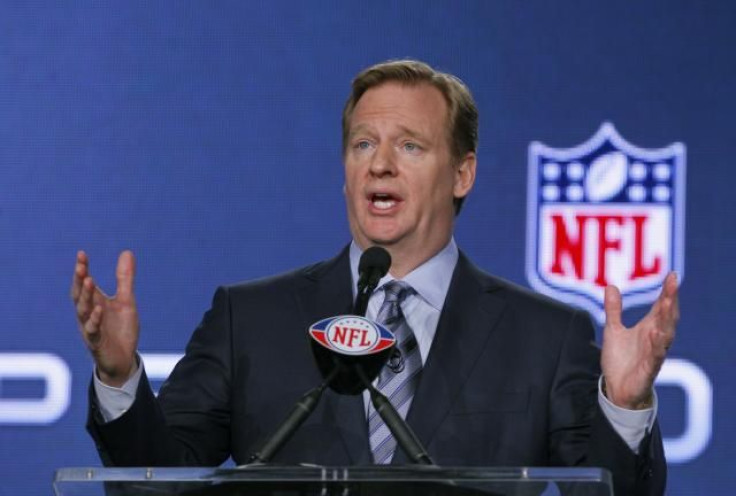NFL 2014: Could Painkillers Surpass Concussions As League’s Biggest Health Concern?

Just as the NFL is correcting its issues with brain injuries, another health concern has gained attention. The government opened an investigation Sunday into potential violations of the Controlled Substances Act as part of what could become the latest headache for commissioner Roger Goodell and the 32 team owners.
Three NFL teams were surprised by visits from the federal Drug Enforcement Administration, as agents met with the San Francisco 49ers, Seattle Seahawks and Tampa Bay Buccaneers. A source told ESPN’s “Outside the Lines” the visits were motivated by a class action suit filed in May by former NFL players that claims team doctors routinely provided players with painkillers in an illegal manner.
"Our teams cooperated with the DEA today and we have no information to indicate that irregularities were found," NFL spokesman Brian McCarthy said in a statement.
While there have been no reports of wrongdoing, the investigation provided another example of health scrutiny for a league that was forced to address concussion concerns thoroughly. The league settled with NFL players for $765 million in addition to installing a new concussion protocol that includes having independent neurological consultants on the sidelines.
The NFL has taken measures to fix its problems with brain injuries, but the painkiller issue evidently hasn't gone away, with the DEA investigation coming in the wake of a lawsuit alleging teams encouraged prescription drug use. The lawsuit filed by a group of approximately 1,300 ex-players, including Marcellus Wiley, Jim McMahon and Richard Dent, is drawing attention to the issue of teams administering drugs without addressing the health risks.
"I never thought I ever abused [painkillers],” said a former NFL player who requested not to be identified but admitted to an NFL culture of players taking painkillers from a medical staff that does little to restrict drugs.
"It’s always a questionable decision, right? They don’t force anything on anyone. Now are they very generous in giving out drugs if you want them? Yes. Many, many, many players take painkillers for practice and games. Way more than any doctor would prescribe."
The source, who played in the NFL within the past five seasons, admitted the “return to play” culture existed while he was in the league.
"It’s all about performance,” he said. “It’s the same thing as the concussions. You just don’t report things because you have to play. If you don’t play, you get cut. If you’re not on the field, you’re not performing, so, therefore, your job is in jeopardy. Most guys would do anything to make sure that they can play. The last thing you want to do is not play. By not playing, you’re giving yourself that stigma that 'this guy can’t tough it out, and he can’t play hurt.'"
While players pressure themselves to be on the field, they also feel the pressure from the front offices and coaching staffs.
“If you’re not on the field performing, regardless of whether it’s a head injury or an ankle injury, they see that and that’s a red flag for them. They want to see guys play through things and not complain and just 'grit it out.' If everybody wanted to be 100 percent healthy, you wouldn’t have a team in the NFL.”
A 2011 study, funded in part by ESPN and a grant from the National Institute on Drug Abuse, found 52 percent of retired NFL players used prescription painkillers during their careers. Seventy-one percent of players who admitted to using the drugs said they misused them. Phone calls to the NFL Program for Substance Abuse were not returned.
Plenty of NFL player have “gritted it out” to severe consequences.
Former Chicago Bear McMahon has said he was given medication to play with a broken neck that went undiagnosed and currently faces early onset dementia because of his playing days. Former San Francisco 49ers lineman Jeremy Newberry was diagnosed with kidney failure after years of taking Toradol to play through injuries, even though he was told the most serious side effect would be bruising. Former Chicago Bears offensive lineman Keith Van Horne is convinced his current heart problems stem from the painkillers he was fed to keep him on the field.
According to the source, Vicodin and Toradol are the main drugs used. The source said roughly 40 percent of players were on Toradol.
Vicodin, to which Brett Favre infamously was addicted during his stint with the Green Bay Packers, enables players to get back on the field by relieving them of pain. Toradol, once described as a “wonder drug” by former safety Darren Sharper, was approved by the FDA in 1989 and is not addictive, but its long-term effects reportedly include kidney damage.
These powerful drugs provided short-term solutions for injuries, which allowed players to remain on the field, even though the drugs could have a negative impact on their long-term health. Just as the government intervened five years ago when Goodell met with the House Judiciary Committee to discuss concussions in the NFL, the DEA inspections may present another government effort to gauge NFL health practices.
An IBTimes staff reporter contributed to this report.
© Copyright IBTimes 2024. All rights reserved.












